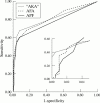Anti-perinuclear factor compared with the so called "antikeratin" antibodies and antibodies to human epidermis filaggrin, in the diagnosis of arthritides
- PMID: 10343539
- PMCID: PMC1752764
- DOI: 10.1136/ard.58.1.42
Anti-perinuclear factor compared with the so called "antikeratin" antibodies and antibodies to human epidermis filaggrin, in the diagnosis of arthritides
Abstract
Objective: Antiperinuclear factor (APF), "antikeratin antibodies" ("AKA"), and antibodies to human epidermis filaggrin (AFA), are highly specific serological markers of rheumatoid arthritis (RA), which recognise epitopes on various isoforms of (pro)filaggrin. It was proposed that these antibodies are globally named antifilaggrin autoantibodies. Here the diagnostic value of the detection of each one is compared and the overlap between the three tests evaluated.
Methods: 492 serum samples were tested, including 279 RA serum samples, taken from patients in France and Belgium. APF and "AKA" titres were estimated by indirect immunofluorescence, and AFA titres by immunoblotting on filaggrin enriched human epidermis extracts.
Results: By a convenient choice of the positivity thresholds, the diagnostic sensitivity and specificity of the tests were shown to be similar (0.52 and 0.97, respectively). Although the antibody titres were strongly correlated, the associations APF-AFA or AFA-"AKA" permitted more than 52% or 55% of RA to be diagnosed, with a specificity of 0.99.
Conclusion: APF, "AKA", and AFA detection have a similar diagnostic value. However, because the three tests do not totally overlap, associating APF with "AKA" or AFA with "AKA" can improve diagnostic sensitivity. None of the three antigens used bear all the epitopes recognised by antifilaggrin autoantibodies.
Figures



References
Publication types
MeSH terms
Substances
LinkOut - more resources
Full Text Sources
Medical

